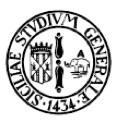Academic Year 2011/12
(10 credits)
Main aims of the course
The course aims to set out the historical factors that have favoured the development of Western philosophical rationality and the main aspects of the philosophical culture of the Eastern Civilizations. It must therefore be seen in the wake of the interest drawn from the so-called “comparative philosophy” in order to understand the principles, language, styles of the Western philosophical tradition in comparison with a tradition that has never had with it persistent and systematic interactions. This will be done both through a general presentation of the main philosophical schools of both traditions of thought, and by the reading of significant texts belonging to both traditions in which it’s possible to recognize the different lectures of the East made by western scholars and philosophers. At the end of the course students will be able to:
• know the principles of construction through which you can conceive of a history of comparative philosophy;
• identify, locate and analyze the major historical philosophers, schools and movements belonging to the Eastern and Western thought;
• know the thought of main philosophers belonging to the two traditions and critically evaluate their reflections;
• expose correctly and through appropriate terminology the way that led, in the individuals, the meeting between the two styles of thought.
To this end the institutional part provides a basic understanding of the history of Western philosophy and the most significant elements of Eastern civilizations, from its beginnings to the present. Topics to be studied are, for the Western philosophy: the birth of philosophy in Greece, Plato and Aristotle, medieval philosophy, natural philosophy and the decline of the birth of experimental science, rationalism and empiricism in the seventeenth and eighteenth centuries; the Enlightenment and the Kantian criticism; idealism; the main currents of contemporary philosophy. For Eastern philosophy: The traditional schools of Hindu thought, Buddhism, Confucianism, Zen Buddhism, Taoism.
1.Suggested readings:
2.AA.VV., Manuale di base di storia della filosofia, Firenze University Press, Firenze 2009 (260 pp. throughout).
3.M. Kaltenmark, La filosofia cinese, Xenia, Milano 1994. [120 pp. circa]
4.L. Meazza – G. Burrini, La filosofia indiana, Xenia, Milano 1994. [120 pp. circa]
Monographic lectures
The monographic course will have as its object the focusing on the comparison of cultures according the perspective of “comparative philosophy” and the introducing some examples of meaningful personal journeys to the East culture.
Suggested readings:
5.G. Pasqualotto, East & West. Identità e dialogo culturale, Marsilio, Venezia 2003 (only the first and second part, pp. 9-160)
6.R. Pirsig, Lo zen e l’arte della manutenzione della motocicletta, Adelphi, Milano 1990
7.T. Terzani, Un altro giro di giostra, TEA, Milano 2004 (or another available edition)
During the year will be distributed and made available to students at the site of the teacher handouts, notes and slides on the topics of the course; it will also been see movies and documentaries on the issues.
Warning
• Students who have only six credits will omit of studying the book suggested in no. 5.




